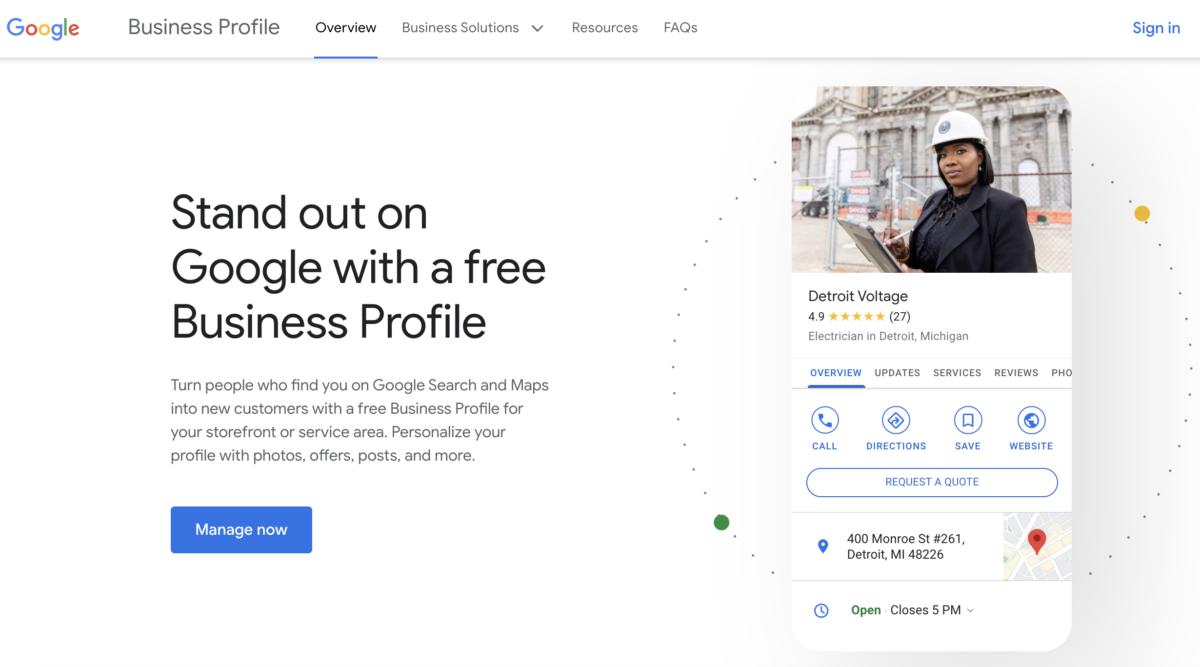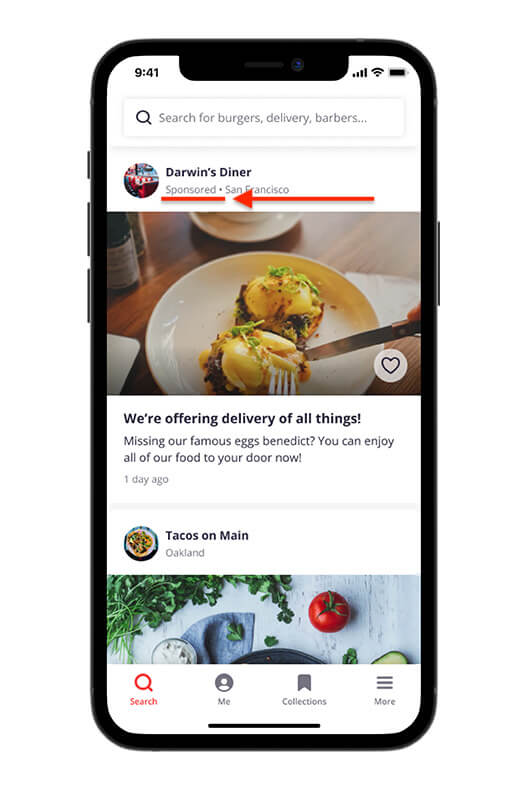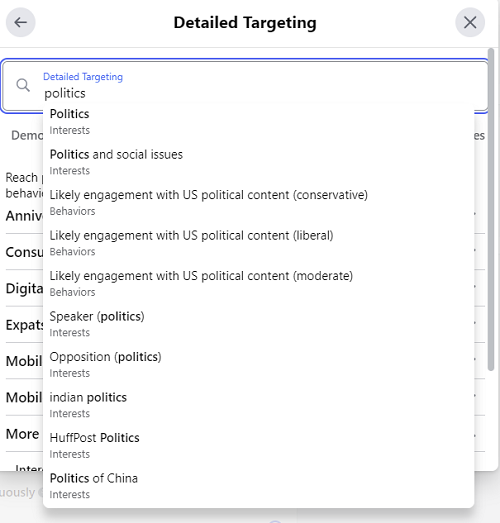In this week’s update, learn about the rollout of the Google My Business name change; how Google will measure local search performance moving forward; the de-emphasis of voice search; Yelp’s photo-centric home feed; Google’s top 100 products for the holidays; and Facebook’s plans to remove thousands of ad targeting options.
Name Change of Google My Business Platform Is Live
Last Wednesday, following with surprising swiftness after Google’s announcement that it would rebrand the Google My Business desktop dashboard with the name Google Business Profile Manager, the new name went live on the platform, at least for some users. The new name is also live on what used to be the main public landing page for Google My Business, which now redirects to the simpler URL google.com/business and shows the Google logo with the title “Business Profile” next to it. Users can still download the SMB-focused Google My Business mobile app, not slated to be discontinued until next year.
In addition, Google has made several updates to its help documentation reflecting the new nomenclature and removing references to Google My Business. Modified pages include:
- “Guidance for businesses affected by COVID-19”: There are several changes to this page, including the removal of a recommendation to download the GMB app in section 6 (“Connect with your customers”), which now recommends turning on messaging in your Business Profile within the Search interface. (In an unrelated move, Google has also removed a section about businesses temporarily operating in an online-only capacity.)
- “Edit your Business Profile on Google”: Several changes here as well, including the recommendation to set your business opening date in Search rather than the GMB app.
- “How to improve your local ranking on Google”: Naming convention changes (as well as a new link to the article “How Google sources & uses info in Business Profiles and local search results”).
- “How to make a post & track its status for your Business Profile”: Naming convention changes and removal of instructions for creating posts via GMB, leaving only Search-based instructions.

The new Google Business Profile landing page
More Information about the New GBP Metrics
Speaking of Google’s help documentation, I thought it was worth calling attention to a detailed help page with the title “Check your Business Profile performance & view Insights” — another of the help pages Google has recently updated, which contains a lot of valuable information about the new methodology Google is using to measure engagement with business profiles. A supplementary page called “Changes to your Insights data” is well worth reviewing as well.
Google tells us on these pages that it has begun rolling out a new concept for measuring engagement which uses the term Performance in order to differentiate it from what has traditionally been called Insights in GMB. New Performance-based metrics are already available in Search and are said to be coming soon to Google Maps; Google also says that the older-style Insights “will eventually be removed from the Google My Business web and app platforms,” suggesting that the new Business Profile Manager may see a migration from Insights to Performance at some point in the near future.
The most important difference between Performance and Insights is a new focus on unique people who view or perform actions in relation to your Business Profile. For example, the new concept for driving directions is to measure unique instances of a person requesting directions to your location, removing noise due to “multi-tapping, direction request cancellation, and spam.” The new concept of people who viewed your Business Profile replaces the older concept of views counted on their own. According to Google, “A user can be counted a limited number of times if they visit your Business Profile on multiple devices and platforms such as desktop or mobile and Google Maps or Google Search. Per breakdown device and platform, a user can only be counted once a day. Multiple daily visits aren’t counted.” Google warns users that the new metrics will not be consistent with the older Insights methodology.
Voice Search Isn’t the Future
Google has offered indications, from the launch of Google Assistant in 2016 to the release of speakable schema markup in 2018, that voice search would be an increasingly important part of SEO as search moves into the future. In a 2021 update to the documentation on speakable schema, Google even suggested that using speakable markup would be one way to reach a broader audience of users, by making news content in particular available to be read aloud. Now Google’s Martin Splitt is suggesting that voice search is not the future — or rather, that in the future, there will be no need to treat voice as a special consideration for SEO. His comments, in conversation with Google’s John Mueller, are somewhat opaque but he seems to be saying that the “input modality” of voice is now merely incidental, and that the backend of Google’s search algorithm has become so capable that it doesn’t much matter whether interfaces are text or voice based, as long as they contain language Google can interpret. This is a departure from predictions offered by Google several years back that voice might replace text as the interface of the future.
Yelp App Launches Photo-Centric Home Feed
Yelp has launched a new home feed for the Yelp mobile app that is being compared to the Instagram interface for its focus on prominent images. The visually oriented feed features content from local restaurants and is rolling out now to 150 cities in the U.S. Content appearing in the new feed comes from Popular Dishes — photos determined by Yelp’s machine learning technology to represent items popular with diners — as well as paid posts from restaurants using the Yelp Connect program. Paid content displays a “Sponsored” label. Feed content is personalized based on proximity to the user, as well as other factors such as the popularity of dishes and the recency of posts.

Yelp’s new feed with a sponsored Connect Post, courtesy Yelp
Pre-Holiday Product Search Trends from Google
Google has published what it predicts will be the 100 most popular products and product categories this holiday season, based on data from Google searches. The trends reflect a mixed view of our current reality, with the popularity of home-based items like coffee makers and fitness equipment reflecting the needs and desires of a still-remote workforce, whereas trending items like fragrances and beauty products suggest people may be eager to get out and see the world. Product categories include gaming, health and beauty, fragrances, kitchen gear, sports and fitness, toys and games, and tech. Among other things, the list provides insight into the brands and products that are winning the highest search volumes these days.
Facebook to Remove Ad Targeting Options for Sensitive Topics
Presumably in response to recent controversies as well as increased public concern over privacy, Facebook has announced plans to remove thousands of ad targeting categories for topics that might be considered sensitive, starting in January 2022. These topics include, according to the announcement, references to “causes, organizations, or public figures that relate to health, race or ethnicity, political affiliation, religion, or sexual orientation.” This appears to mean that ads can no longer be targeted based on now-common options such as political affiliation, a potentially significant change for the company. Brands who have used support for various causes as a means to connect with the Facebook community may find this tactic more difficult to put into practice.
The change comes in part due to the European GDPR regulations, which would essentially make it illegal to target users based on protected characteristics without their express consent. Facebook has been fighting the regulations, without success, since they went into effect in 2018.

Some of Facebook’s current options for detailed targeting, courtesy Social Media Today
Subscribe to Local Memo!
Signup to receive Local memo updates and the latest on localized marketing, delivered weekly to your inbox.